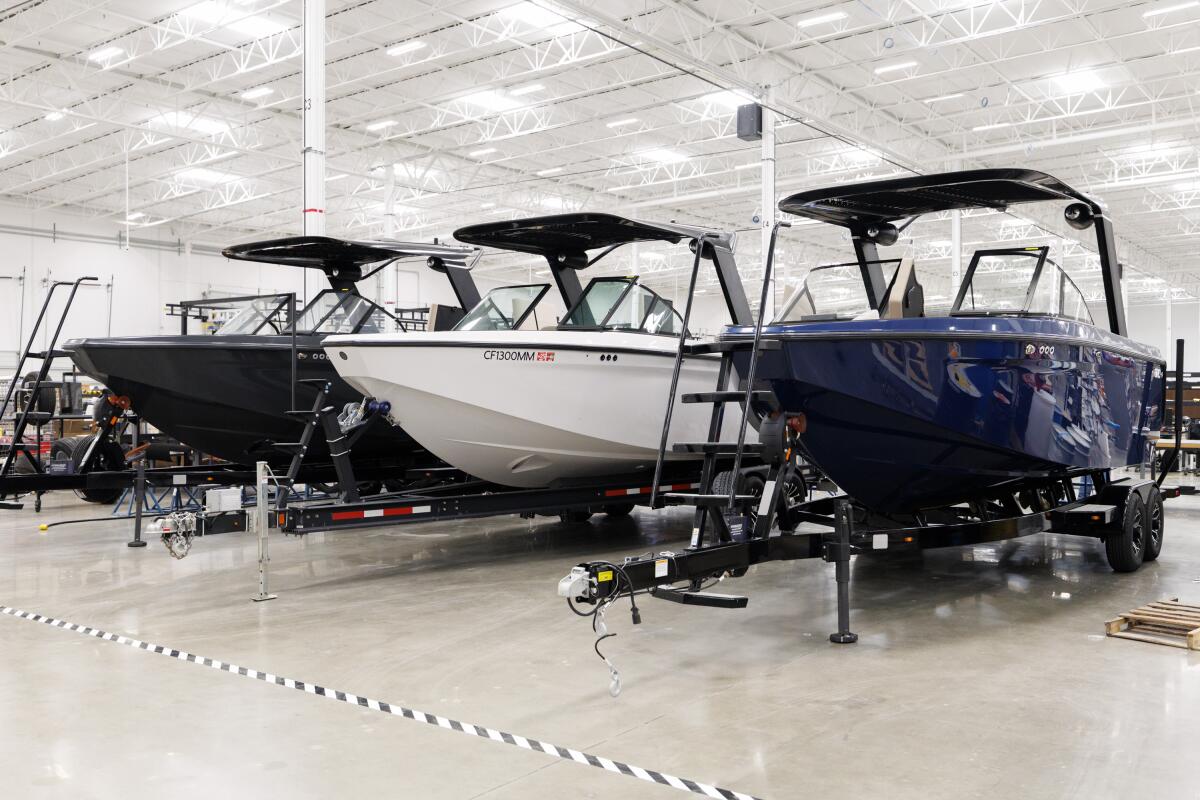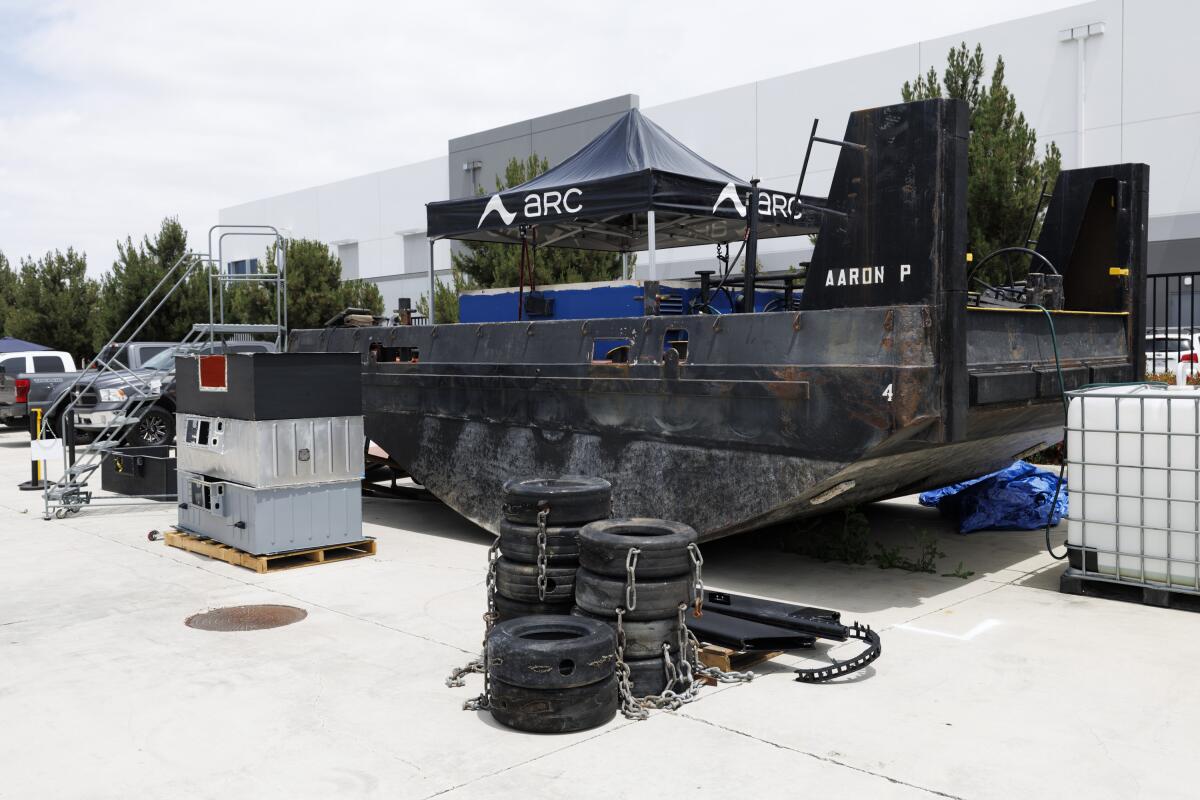This Southland boat company wants to electrify the Port of Los Angeles

- Share via
An electric boat company with roots in Torrance is taking steps to bring battery-powered workboats and charging infrastructure to the Port of Los Angeles, where diesel-burning vessels emit tons of carbon dioxide.
Arc Boat Co., a Southern California startup that sells electric boats for recreational use, said it will open a research and development facility at the port in June.
The facility signals a move toward electrification at the nation’s busiest port and marks Arc’s expansion into the commercial sector.
Arc’s promise to deliver an electrified fleet of workboats comes five years ahead of a 2030 deadline set by the ports of Los Angeles and Long Beach to transition to zero-emission equipment.
The twin ports, situated on more than 10,000 acres on San Pedro Bay, rely on heavy-duty cranes, tugboats and trucks to move cargo. Replacing the roughly 2,000 tugboats in the U.S. with electric alternatives could prevent more than 1.6 million cars’ worth of greenhouse gas emissions annually, according to Arc.
The grant is part of a larger $3-billion initiative to deploy zero-emission equipment at the nation’s ports, which are significant sources of pollution.
“Across the entire marine industry, going electric makes an incredible amount of sense,” Arc co-founder and Chief Executive Mitch Lee said in an interview. “These boats don’t have fumes, and you can cut your operating costs substantially.”
Electric boats require minimal maintenance and zero fuel, an appealing combination for commercial operators who want to save money and consumers looking to enjoy the water, Lee said. Arc’s boats are also quieter and easier to maneuver than traditional boats, he said.

The electrification of vehicles on the water could soon gain momentum, said Petros Ioannou, an engineering professor at USC who researches transportation technology.
“The main reason for going electric is really the environment,” Ioannou said. “The question is whether they are able to solve the technological and logistical problems” presented by electric boats, including power, range and charging limitations.
Despite the challenges of building a battery capable of propelling a boat, several companies including Navier and X Shore are producing and selling electric vessels. Arc’s business currently revolves around recreational boats for water sports, starting at $268,000.
In a partnership with Portland, Ore.-based shipyard Diversified Marine Inc., Arc plans to retrofit a 26-foot-long truckable tugboat with lithium-ion battery packs and a 600-horsepower drivetrain. The vessel will be the first zero-emission tug to support operations at the Port of Los Angeles, Arc said.
Tugboats are an essential tool at the ports of Los Angeles and Long Beach, where they guide larger vessels and move equipment such as barges and cranes.
Southern California air quality officials have again failed to adopt rules to clean pollution at the ports of L.A. and Long Beach, backing down in the face of opposition from organized labor and business interests.
“Tugs run short, repetitive missions requiring high torque, and start and end at the same home base,” Arc said in a statement announcing its retrofitting project. “Not only does that make them well-suited to going electric, but doing so drastically reduces operating expenses.”
Teaming up with Diversified Marine allows Arc to launch its new workboat in collaboration with several entities that do business at the port, Lee said.
“Diversified already knows how to tap into the port operations and get this vessel to work,” he said. “We’re modernizing their tugboat and deploying it into the Port of L.A., and we’re able to provide charging infrastructure as well.”

Switching from diesel-powered to electric workboats can save commercial operators roughly 50% on maintenance and fuel costs, Lee said, adding that Arc’s new research and development facility will provide the groundwork to make the switch possible.
The company did not disclose how much money it was putting into the research facility and accompanying charging network, but said it probably will require an investment of less than $10 million.
The facility will sit within a 35-acre research campus operated by the nonprofit AltaSea. It will support prototype development of electric workboats, on-water testing and fleet deployment, Arc said. The company builds its battery packs out of a separate facility in Los Angeles.
“Decarbonization at our ports is a critical step to achieving real, substantive climate progress,” AltaSea said in a statement. “Arc Boat’s new R&D facility and charging infrastructure will help make the Port of L.A. a global model for sustainable maritime operations.”
Launched in 2021 by former Boeing and SpaceX engineers, Arc has a mission to electrify everything on the water, Lee said. Before co-founding Arc with fellow Northwestern alum Ryan Cook, Lee grew up in the Bay Area and frequently boated with his family.
Arc has received more than $100 million in investment funds from California-based venture capital firms including Andreessen Horowitz and Lower Carbon Capital, among others. The startup employs 170 people, including experts with backgrounds at electric vehicle companies Rivian and Tesla.
The company did not disclose its annual revenue, but said demand for its boats is high. Two models are available to be delivered nationwide, including the Arc Sport, designed for wake surfing and water skiing; and the Arc One, a luxury cruiser.
Arc is the only electric boat company to build its own battery packs in-house, Lee said.
Although assembly is done in Los Angeles, President Trump’s steep tariffs on U.S. trade partners — including a 145% tax on goods imported from China — have still presented a challenge. The tariff on China has since been reduced to 30%.
“We are definitely impacted by tariffs and the electric vehicle market has heavy ties to Chinese supply chains,” Lee said. “We’re also ahead of the curve and far more vertically integrated than most companies.”
As President Trump’s tariffs lead to less cargo moving through the ports of Los Angeles and Long Beach, U.S. representatives from California voice concerns.
With ambitions to build electric boats capable of hauling cargo and traveling long distances, Arc will need to stay at the forefront of battery development, Ioannou from USC said. Producing its batteries domestically may give Arc an advantage as tariffs disrupt global trade.
“Whether this space will progress in a rapid way will very much depend on the battery technology and availability,” Ioannou said.
“When you go from gasoline to electric, there are certain benefits that you get, but a lot of headaches too,” he said.
More to Read
Inside the business of entertainment
The Wide Shot brings you news, analysis and insights on everything from streaming wars to production — and what it all means for the future.
You may occasionally receive promotional content from the Los Angeles Times.













